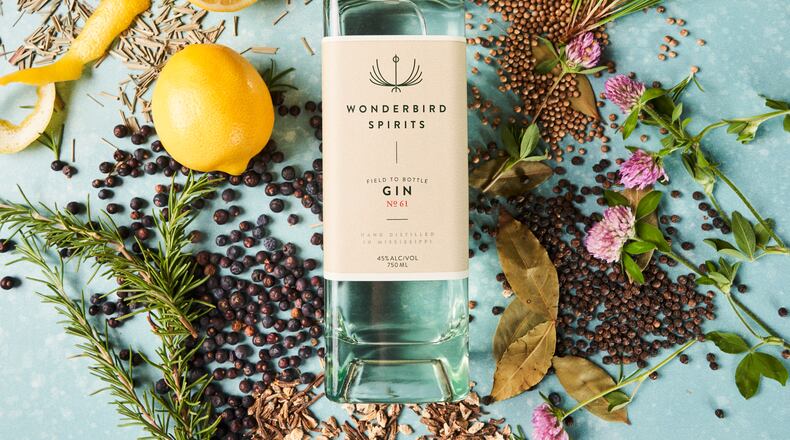The Mississippi Delta has lush, rolling hills rising from fertile flatlands, alluvial swamps, serpentine rivers and pine forests teeming with wildlife. With Wonderbird No. 61 gin, three entrepreneurs with ties to the area have tried to capture in a bottle the sensory delights of the fertile crescent.
Wonderbird Spirits, which started in 2018 near Oxford, is northern Mississippi’s first distillery, the brainchild of Thomas Alexander, Rob Forster and Chand Harlow. Its name and logo pay tribute to the fact that the Delta is the most important bird and waterfowl migration corridor on the continent, with more than 325 species migrating through it. “The name is meant to evoke new beginnings and a sense of optimism,” Forster said.
Added Alexander: “It makes sense that a world-class gin can come from here, if you look around and see the flora that comes from this place.”
Gin typically is made from a blend of grains, including wheat, barley and rye, with the only requirements being the inclusion of juniper, and proof of at least 80. However, Wonderbird is the only known U.S. gin with rice as a base, and only the third in the world, the other two being in Japan.
Credit: Wonderbird Spirits
Credit: Wonderbird Spirits
Using rice in the gin is another connection with the Delta. They tried corn, and even sweet potatoes, but settled on rice from family-run, single-estate Two Brooks Farm. “When a friend put us in touch, and they gave us samples of their jasmine rice to play around with, we knew we had found our fermentation substrate,” Forster said. The use of 100% jasmine rice lends a subtly complex flavor profile, as well as a clean foundation, with natural aromatics.
In another creative touch, Wonderbird gin is made using koji, the same fermentation agent used in making soy sauce and sake. The koji sets enzymes to work, breaking down rice starches into simple sugars that easily are converted into alcohol. The koji is soaked, steamed, mixed with rice, fermented and then introduced to yeast, and distilled. There is a natural aquifer below the distillery’s property, providing a pure water source. The neutral spirit produced goes through numerous distillations in a pot column hybrid still.
The number 61 in the gin’s name signifies the 61st combination of the 10 botanicals they settled on during months of recipe development. “We continued up into the 80s, but kept coming back to 61 as a standout iteration,” Forster said.
During the building of the distillery, the team asked a professional forager to walk the 20 acres of largely wooded hills with them. “Over a very hot six hours, he showed us perhaps 20 potential botanicals for our gin growing natively on the land,” he added.
Two of the 10 botanicals they used came from their property. Native tribes from the area used red clover as medicinal tea; red clover tops provide a chamomile-like note in the gin. The Choctaw also used the Southern loblolly pine needles for medicinal purposes, and pine shoots from a tree behind the distillery offer flavor, as well as a singularity to each bottle.
For the best expression, each added botanical is distilled individually, calling out precise notes and further cleaning and smoothing the distillate. The botanicals then are blended, which leads to a more layered spirit.
On the nose, Wonderbird is delicate, with a hint of vanilla, not unlike the flowers of clematis, which trail over fences and riverbanks in the Delta. There is a weighty mouthfeel from the jasmine rice, a silky sweetness that envelopes and complements the botanicals. In addition to the soft, expected juniper, herbal bay leaf, rosemary and lemongrass complement restrained notes of coriander and black tellicherry peppercorn. There’s a touch of wormwood-like Angelica root, too. The finish is lemon peel. Meyer lemon is used, for a more delicate citrus approach that lingers.
The end result tastes thoughtful, and is wonderful over a cube.
Experts agree. Wonderbird No. 61 garnered two gold medals at the San Francisco World Spirits competition in 2020, and the first of an experimental gin series, No. 97 Magnolia (made with the fresh magnolia blossoms) won gold in 2021.
For many distilleries, gin is a necessary pursuit while they wait for whiskey to mature. That is not the case at Wonderbird, where the endgame is a world-class gin with a taste of place.
“We will be a gin house for the foreseeable future,” Forster said. “We like the creativity gin allows, and esteem its place in cocktail history and culture.”
Wonderbird (wonderbirdspirits.com) is expanding its rollout in Georgia, with 750-milliliter bottles currently available for $49 at Bim’s Liquor, Little Five Package, Decatur Package, Elemental Spirits, Holeman & Finch Bottle Shop and All American Package.
Sign up for the AJC Food and Dining Newsletter
Read more stories like this by liking Atlanta Restaurant Scene on Facebook, following @ATLDiningNews on Twitter and @ajcdining on Instagram.
About the Author
The Latest
Featured



